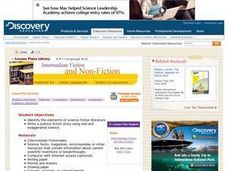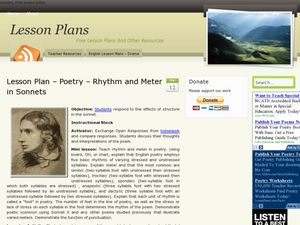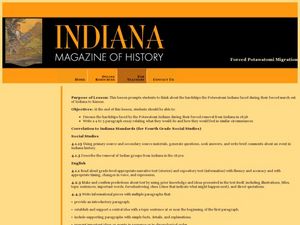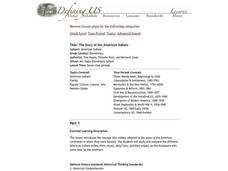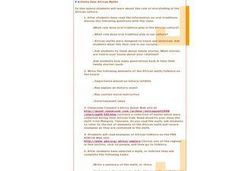Curated OER
Common Good
Young scholars explore the concept of philanthropy. In this service learning lesson, students read stories and then discuss the meaning of philanthropy as they identify ways the characters contribute to the common good.
Curated OER
The Magic Pot
In this reading comprehension lesson, students use the book "The Magic Pot," to explore many concepts including; story elements, sequencing, and phonics. Students also practice making doubles using coins and "magic pots." This very...
Curated OER
Thematic Unit: Beginning Holocaust Studies
Fifth graders discuss concepts of diversity, culture, and prejudice, gain understanding of harm caused by prejudice, and demonstrate ability to think critically and a desire to act morally.
Curated OER
Science Fiction Literature
Young scholars identify the elements of science fiction literature. They write and illustrate a science fiction story using real and exaggerated science. In addition, they read their stories aloud in small groups.
Curated OER
Seems Like a Million Bucks
Students explore philanthropy. In this service learning lesson, students read Sam and the Lucky Moon, identify the elements of the story, and examine the benefits and costs of giving.
Curated OER
Partners for the Common Good: One Day
Fourth graders explore the concept of philanthropy. In this service learning lesson, 4th graders compare for profit and nonprofit organizations. Students explore nonprofit organizations in their community and discuss their philanthropic...
Curated OER
Comparing Tales through Performance
Students compare and contrast versions of The Three Little Pigs. In this fairy tale lesson, students read 3 versions of the fairy tale and dramatize them in order to analyze the similarities and differences.
Curated OER
3-D Attributes
Students explore geometric solids. In this geometry lesson, students listen to the book The Greedy Triangle by Marilyn Burns, then work in groups to sort geometric solids into various categories. Students define geometric solids...
Curated OER
Spring is Here
Students analyze changes between winter and spring. In this seasonal changes lesson, students read the story "Spring is Here." They record changes between winter and spring on a large chart paper. Students compare and contrast the...
Curated OER
Walk a day in my moccasins
Students create videos about students in their classroom. In this self-expression lesson plan, students use videos to give voice to students who are reluctant or can't participate. Students listen to several books and generate questions...
Curated OER
All About Me!
Students write about themselves. In this descriptive writing lesson, students view a PowerPoint for examples of descriptive writing and then write sentences describing themselves. Students use a computer program to type their sentences...
Curated OER
In the Middle - Middle School Poetry
Students analyze and interpret poems. In this poetry lesson, students are read poems aloud, discuss the meanings in groups, and complete two worksheets after listening to the poems. Links to the worksheets and discussion questions are...
Curated OER
Poetry--Rhythm and Meter in Sonnets
Students identify rhyme scheme and meter in a poem and respond to the message of the poem. In this sonnet rhythm and meter lesson, students take notes on a lecture about rhythm and meter in sonnets and work in small groups to read...
Curated OER
Slavery and the Underground Railroad
Third graders discover racism in our country by investigating the Internet. In this abolitionist movement lesson plan, 3rd graders define the Underground Railroad and participate in an activity by logging on to an on-line History...
Curated OER
Changing the End of a Story
Second graders re-write a story. In this alternate endings lesson, 2nd graders read Alexander and the Wind-Up Mouse, by Leo Lionni, stopping to discuss the events and predict what will happen next. Students work in groups to come up with...
Curated OER
Forced Potawatomi Migration
Fourth graders write about the forced Potawatomi migration. In this primary source lesson students are read journal entries from an emigrating party of Potawatomi Indians. Students reflect on the items the Indians might have taken with...
Curated OER
Natural Disasters
Students read the book "Tsunami!" and discuss natural disasters and how they can prepare. This lesson is much more than a study of tsunamis. The lesson is chock-full of ways to study the Japanese culture across the curriculum. There are...
Alabama Learning Exchange
Have You Seen My Mother?
Students listen to a read aloud of Janell Cannon's, Stellaluna as they examine how bats use their sense of smell. They examine the sense of smell by role playing as mother bats as identify different scents. They study bat facts at an...
Curated OER
American Indians
Students research early Indian adaptations in this lesson. They research the different American Indian tribes. They also research and compare the tribes' rituals, daily lives, and their impact on the Europeans who came later to the...
Curated OER
Census and Apportionment
Students manage census data. In this U.S. Census lesson plan, students understand and describe the role census data play in apportionment decisions as they analyze the connection between apportionment and the Electoral College.
Curated OER
I love My Hair
Students explore strategies to help focus on writing a personal narrative. In this personal narrative writing lesson, students read a book and discuss how the author lets readers know how they feel. Students find a moment in their own...
Curated OER
African Myths
Students discover the role of storytelling in the African culture. In this multicultural lesson, students discuss the elements of the African myth and record them on the board. Students visit an African folktale website and read examples...
Curated OER
The Parts of a Tree
Students create a tree model. In this parts of a tree lesson, students read A Tree is a Plant, then discuss what trees are used for. Students use various materials to build and label their own tree.
Curated OER
Venerable Inventors
Students discuss important historic inventors and read their biographical information. For this world history lesson, students describe Alexander Bell, Thomas Edison, and Guglielmo Marconi using vocabulary terms used in their text....





